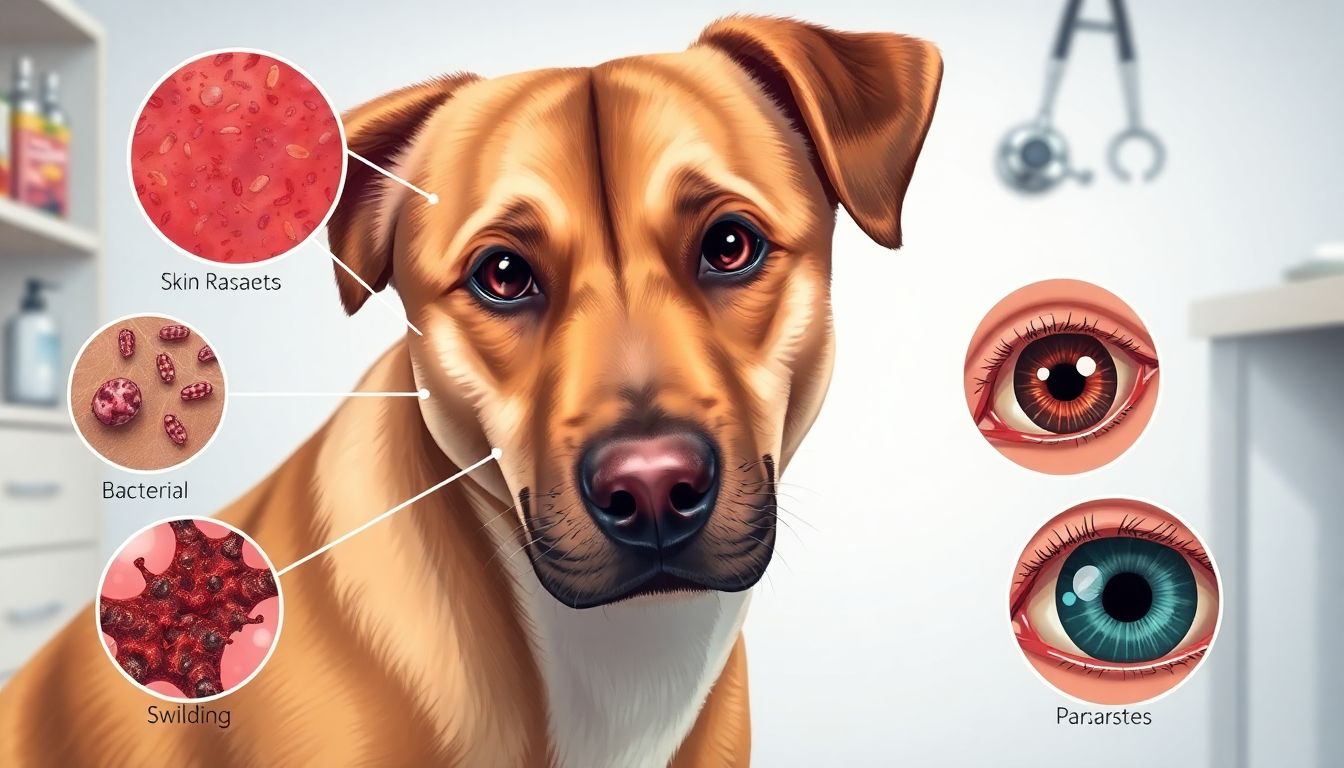Introduction
Being a responsible dog-parent means more than fulfilling your furry friend’s feeding and playing needs; early detection of the problem could mean your pooch’s well-being and happiness. Many illnesses that affect the dog show symptoms that the owner can pick up, given that they know what to look for. Quick detection of the signs will allow your vet to treat the beginning problems before they snowball into emergencies. This guide will enlighten owners on common dog ailments, the symptoms to watch for, and when to visit the veterinarian. Keeping track of such things ensures that your dog remains healthy and lively for many more years.
Common Dog Diseases Every Owner Should Be Aware of
Introduction to Common Canine-Seen Problems
Dogs get into all sorts of health problems—from infections, via parasites, to chronic conditions. Certain diseases spread readily among dogs, like kennel cough and parvovirus; others, such as arthritis or diabetes, develop slowly over time. Recognition of these common diseases is, in general, the knowing of their way to keeping your pet healthy. Usually, they exhibit some sign or symptom that can be easily recognized by yourself from home, thus allowing you to spring into action.
Effect of Early Diagnosis on Success of Treatment
Catching a disease early is always better for treating that disease. For instance, heartworm evaluation and consequent treatment are easily administered and lesser in risk when caught early. The same holds true for parvovirus, a fast-acting killer if not treated in the earliest state. So, once the owner recognizes the early signs of disease, the dog being treated will have better chances of recovery.
Respiratory Diseases and Their Symptoms in Dogs
Respiratory infection and signs
Breathing problems are quite notorious for dogs, especially within selective breeds. Look for anything from coughs, sneezing, nasal discharge, and labored breathing to wheezing. These signs might denote kennel cough or pneumonia. Mention Dr. French bulldogs or Dr. Pugs connoisseur: Trouble befalls the short-nosed dogs.
Chronic Respiratory Conditions
Some dogs would have ongoing breathing problems such as bronchitis or collapsing trachea. They can be coughing all the time or generally just not up to pa during walks. These conditions are treated with medications and avoidance of irritants like smoke or dust. Regular visits to the vet ensure that chronic conditions are maintained and that your dog has a good quality of life.
Digestive System Diseases and Symptoms
Common gastrointestinal disorders
When the dog’s digestive system is adversely affected, vomiting, diarrhea, or constipation of brief duration would be seen. These could be caused by bacterial infections, ingestion of some stomach-wrecking food, or simply some parasites. Parvovirus outbreaks among unvaccinated pups are common. Observing eating habits addresses issues in the early stages.
Signs indicating a serious digestive problem
Blood in the stool, profound dehydration, or weight loss are serious indicatory signs. One should take the dog to the vet immediately if an affected dog shows lethargy and stops eating. These signs probably indicate serious problems that require immediate intervention.
Skin and Ear Conditions in Dogs
Recognition of skin infections and allergies
Itching, redness, hair loss, or sores can mark skin problems. Allergies, fleas, or fungal infections can cause these symptoms. Any persistent skin issues should be checked, as they oftentimes require special therapy. The sooner the identification, the better it will be to save from discomfort and decreasing infections.
Ear infections and clinical signs
Foul odor, shaking his head, or discharge; all are evidence that something is brewing up there in the ear. Routine ear cleaning and close observation during the onset of signs will help avoid big-time infections.
Parasitic Diseases in Dogs
Fleas, ticks, and mites
If your dog is scratching or losing hair, fleas or mites could be the cause. Small but irritating, these parasites inflict misery upon the dog and even transmit diseases. Prevention of these infestations through regular treatments and cleaning of the yard will minimize any risks.
Internal parasites
Worms inside can manifest weight loss, anemia, or the presence of worms in the stool. Routine deworming and medical checkups remain crucial. In certain cases, worms could cause further severe health complications without displaying any signs.
Chronic and Hidden Diseases in Dogs
Heart disease
Symptoms like coughing, lethargy, and fainting often hide heart problems. Certain breeds, like Dobermans, are predisposed to these problems. Earlier the diagnosis is made, the sooner the physician can begin treatment, which helps extend the duration of life and improve its quality.
Joint and mobility issues
Joint problems will be evidenced by limping, reluctance to move, or swollen joints. Arthritis can affect old dogs. Regular exercise, a healthy diet, and supplements may promote joint health.
Diabetes and metabolic disorders
Increased thirst, increased urination, or sudden changes in weight indicate diabetes and other disorders of metabolism. Routine diet and medication would successfully control these conditions and enhance your dog’s comfort.
When to Consult the Veterinarian
Immediate calls to the vet should be taken when breathing problems, collapse, or severe pain are witnessed. Regular checkups are very helpful in catching health problems before they get worse. Maintain a record for your dog in terms of general behavioral changes, eating habits, and activity levels. Timely visits keep minor issues from turning major emergencies.
Conclusion
Watching for early signs of illness in your dog often means a longer, happier life together. Keep the vet’s office number by the phone, and be alert for any changes in behavior. Keeping well informed, being up to date on vaccinations and parasite prevention, and consulting professionals as required will provide the best outcome for your canine friend. It will greatly change your dog’s life and will provide health and happiness.









